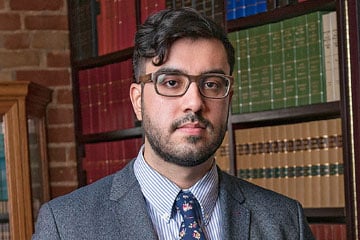
Unpaid work, student debt, the partnership path and costs of running an election are some of the issues that face new calls running for representation at the Law Society of Ontario, say bencher hopefuls in the early stages of their careers.

Unpaid work, student debt, the partnership path and costs of running an election are some of the issues that face new calls running for representation at the Law Society of Ontario, say bencher hopefuls in the early stages of their careers.
Nima Hojjati, an associate at Swadron Associates in Toronto, who was called to the bar last year, said he has considered running, but he ultimately decided against it.
“Winning an election seems like an impossible task. There are two categories of people who can become benchers. If you are in a good place in your career, a prominent lawyer, you can let your reputation speak for itself,” says Hojjati, who is chairman of the LSO’s Equity Advisory Group, which is not open to benchers. “And the other big thing is if you have the resources for it. . . . When you don’t have any money, that’s a big hill to climb.”
Sean Robichaud, lead counsel at Robichaud’s, who practises in Toronto and throughout Ontario and was called to the bar in 2005, is advocating in his bencher campaign for a special category to ensure the presence of newer calls in Convocation.
He says part of the reason he’s running is that Convocation needs benchers who are in the earlier stages of their career and who can influence policy outcomes by the regulator.
“If you are a younger lawyer at a ‘seven sisters’ firm and you are running against a senior partner or two at the same firm, the chances of the firm putting the resources to a younger lawyer is obviously not going to work in your favour,” says Robichaud.
Historically, it is indeed rare for recent calls to serve in Convocation, according to research by Professor Noel Semple.
In 2016, Semple published an article in the Canadian Journal of Law and Society that showed that early-career lawyers were “completely unrepresented in the Law Society’s elected leadership.”
After analyzing candidate campaign materials and voting pattern data from five LSUC bencher elections since 1999, Semple found that while almost half of Ontario lawyers had been practising for less than 15 years, only two of the 40 lawyers elected fell into that category in 2015.
“These two benchers had twelve and thirteen years of experience respectively. None of the benchers elected in 2015 were among Ontario’s lawyers in the first decade of practice, who made up 25 to 30 percent of all lawyers in the province,” Semple wrote.
“The average bencher elected over this period had been licensed in Ontario for 27.53 years at the time of his or her election.”
Jacqueline Horvat, a partner and co-founder of Spark LLP, who mostly practises in Windsor and was called to the bar in 2002, was elected in 2011 with nine years of experience in the profession.
The Law Society Gazette said she was the youngest bencher ever elected at age 33.
Horvat says she was lucky to work with former LSO treasurer Harvey Strosberg, who supported her candidacy and campaigned on her behalf.
Horvat has since spoken at Convocation about issues that might affect the candidacy of benchers, such as a policy that requires benchers to work at least 26 days before being remunerated at a rate of $585 per day and $355 per half-day (as of 2018).
“I wasn’t judged on the hours I billed or face time in the office,” says Horvat.
“If you are at a firm that cares a lot about billable hours and that’s the only requirement they look at for things like bonuses and partnership, then it may be a problem.”
Although it is rare for early-career lawyers to serve in Convocation as benchers, the law society has made decisions that affect this group.
In December, Convocation altered the training process for aspiring lawyers, approving a proposal to mandate pay for articling students and audit the firms where they work beginning May 1, 2021.
The body also approved a proposal last year to add a new law school to the province at Ryerson University, although the plan has since met roadblocks at the provincial level.
Signa Daum Shanks, who has taught law students since 2010 and is running for bencher, says it would be helpful for the law society to collect data on how mounting fees affect early-career lawyers.
The LSO’s licensure fees, which must be paid by law graduates hoping to enter the field, include $2,800 for experiential training, $750 for each of the barristers and solicitors exams and $160 for application fees.
“It’s so difficult for new lawyers to get on their feet, so that idea of being able to contribute to the legal profession, supporting its self-regulation, is a really difficult one to imagine because of other pressures,” she says.
New calls are not the only group that have criticized Convocation’s composition in terms of years of experience.
The regulatory body approved last year a policy that would restrict the rights of many long-time members or “life” benchers.
“You can’t just create a binder labelled ‘institutional memory’ and hand it off,” former LSO treasurer Vern Krishna, counsel at TaxChambers LLP in Toronto and law professor at the University of Ottawa, told Law Times in December 2018.
“The loss of corporate memory is unfortunate because it shifts the balance of power.”
Robichaud says that while he supports a designated role for early-career lawyers, the body should remain weighted toward veteran members of the profession.
“People with extensive experience in the practice are invaluable and we certainly would not want to discourage more experienced members of the bar from running — if anything perhaps it should be weighted toward seniority. The problem we face is there is simply no younger perspective,” he says.